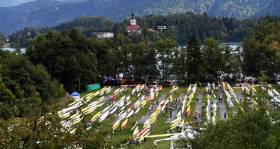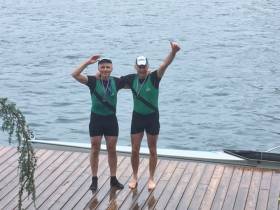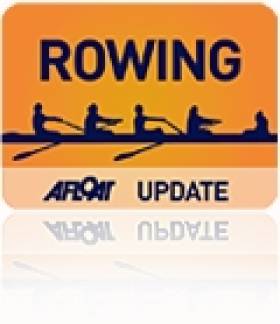Displaying items by tag: Bled
Sweet Win For Irish Composite Eight at World Masters
#Rowing: One of the leading Irish boats at the World Masters Regatta in Bled in Slovenia clocked up a notable win today. The E eight made up of competitors from Belfast Boat Club, Commercial, Neptune and Waterford beat Dynamo of Russia, who have been their constant rivals of recent years. The margin was extremely tight – just .26 of a second.
World Masters Regatta, Bled, Slovenia, Day Four
Men
Eight ‘E’ (Avg 55 or more) – Heat Three: Waterford, Neptune, Commercial, Belfast BC (A Penkert, J Hudson, D Crowley, G Murphy, M Heavey, C Dickson, C Hunter, F O’Toole, D McGuinness) 3:07.88.
Irish Scullers, Pair and Four Win at World Masters
#Rowing: Two Irish scullers, a four and a pair led the Irish charge at the World Masters Regatta in Bled in Slovenia today. Denis Crowley of Commercial and Sean Heaney of Galway joined John Hudson and Gerry Murphy of Neptune as medal winners. The four of Rob Forde, Patrick Fowler, Oisin McGrath and Gary O’Neill also won – but after being adjudged late in the heat they had entered. They were moved into another heat, and came out on top there.
Three Irish eights just missed out, taking second place in their heats.
World Masters Regatta, Bled, Slovenia, Day Two (Selected Results; Irish interest; all heats of 1,000 metres, winners only)
Men
Four ‘C’ (avg age 43 or more) – Heat Five: Commercial, Clonmel, Neptune (R Forde, P Fowler, O McGrath, G O’Neill) 3:18.46.
Pair ‘E’ (avg 55 or more) – Heat Six: Neptune (J Hudson, G Murphy) 3:41.11.
Sculling, Single ‘D’ (50 or more) – Heat 11: Galway RC (S Heaney) 3:50.17. Heat 16: Commercial (D Crowley) 3:48.93.
Ireland and France Locked Together in C Final in Bled
Ireland’s Siobhan McCrohan and Claire Lambe just pipped France in a photo finish for fifth in the C Final of the lightweight women’s double scull at the World Rowing Championships in Bled in Slovenia. The original results gave the two crews as joint fifth (17th overall), but the official verdict eventually gave fifth place to Ireland and sixth to France.
Sweden and Belarus were locked together in first and second for much of the race and finished in this order. Ireland, Poland, Spain and France were in the following group. Poland finished well to take third and Spain took fourth. Ireland and France crossed the line together in the same time of seven minutes 10.56 seconds.
World Rowing Championships, Bled, Slovenia – Day Seven (Selected Results)
Men
Pair – A Final: 1 New Zealand 6:14.77, 2 Britain 6:16.27, 3 Italy 6:21.33.
Quadruple Sculls – A Final: 1 Australia 5:39.31, 2 Germany 5:39.56, 3 Croatia 5:42.82.
Single Sculls – A Final: 1 New Zealand (M Drysdale) 6:39.56, 2 Czech Republic (O Synek) 6:40.05, 3 Britain (A Campbell) 6:44.86.
Women
Four – A Final: 1 United States 6:30.30, 2 Australia 6:31.18, 3 Netherlands 6:34.06.
Lightweight Quadruple Scull – A Final: 1 Britain 6:28.14, 2 China 6:30.41, 3 United States 6:33.91.
Double Scull – A Final: 1 Britain 6:44.73, 2 Australia 6:45.98, 3 New Zealand 6:46.74. B Final (Places 7 to 12; first two boats qualify for Olympic Games 2012): 1 Germany 6:57.43, 2 China 6:58.41, 3 United States 6:59.83, 4 Finland 7:04.51, 5 Serbia 7:05.75, 6 Ireland (L Dilleen, S Puspure) 7:13.92.
Lightweight Double Scull – C Final (Places 13 to 18): 1 Sweden 7:03.67, 2 Belarus 7:05.20, 3 Poland 7:07.97, 4 Spain 7:08.53, 5= Ireland 7:10.56, France 7:10.56.
Adaptive
Legs, Trunk and Arms Mixed coxed Four – A/B Semi-Final (First Three to A/B Semi-Final; rest to B Final): 1 Germany 3:30.78, 2 Ireland (A-M McDaid, S Caffrey, S Ryan, K du Toit; cox: H Arbuthnot) 3:32.63, 3 United States 3:32.98; 4 China 3:35.66, 5 Italy 3:41.51, 6 Russia 3:45.79.































































